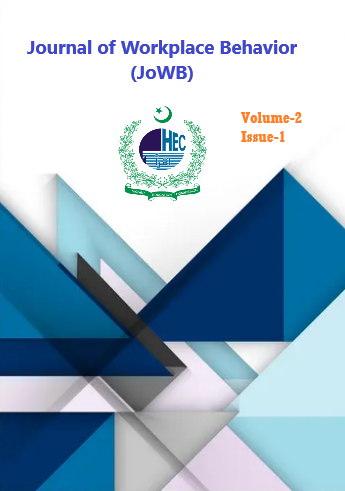Reciprocal Relationship among Job Crafting, Work Engagement, Leader-Member Exchange, and Person-Environment Fit: A Study of Tourist Guide in Pakistan
Main Article Content
Abstract
Tourism industry is considered as the main source of overall economic growth in both emerging and developed countries. It plays an important role in the economic development and improving national income. Pakistan is a developing country and it has rich natural resources as well as diverse tourist spots. Currently, tourism industry in Pakistan is gradually developing and it has positive impact on economic growth. In this connection, this study has been undertaken to investigate the reciprocal relationship among job crafting, work engagement, leader member exchange, and person-environment fit in tourism industry of Pakistan. For analysis, primary data has been collected from 306 respondents and linear regression analysis has been employed to test the study hypotheses. Result of the study showed that there exist a positive and significant relationship between job crafting and work engagement. Further it is observed that job crafting strongly correlated with leader member exchange. Result of the study also showed that job crafting positively associated with person environment fit. The findings of the study are important for the policy makers to develop effective policies regarding tourism and employees of tourism sector organizations.
Article Details
References
Abou Hamdan, O., Yeadon-Lee, A., & Rachel, C. (2018). Leader-member Exchange within Academic Research Teams: An Exploration of the Relationship between the Research Team Leader and Research Member (s).
Andela, M., & van der Doef, M. (2019). A comprehensive assessment of the person– environment fit dimensions and their relationships with work-related outcomes. Journal of Career Development, 46(5), 567-582.
Arshad, M. I., Iqbal, M. A., & Shahbaz, M. (2018). Pakistan tourism industry and challenges: a review. Asia Pacific Journal of Tourism Research, 23(2), 121-132.
Bakker, A. B. (2011). An evidence-based model of work engagement. Current directions in psychological science, 20(4), 265-269.
Bakker, A. B., & Albrecht, S. (2018). Work engagement: current trends. Career Development International.
Bakker, A. B., & Schaufeli, W. B. (2015). Work engagement. Wiley Encyclopedia of Management, 1-5.
Bakker, A. B., Schaufeli, W. B., Leiter, M. P., & Taris, T. W. (2008). Work engagement: An emerging concept in occupational health psychology. Work & stress, 22(3), 187-200.
Bakker, A. B., Tims, M., & Derks, D. (2012). Proactive personality and job performance: The role of job crafting and work engagement. Human relations, 65(10), 1359-1378.
Berdicchia, D., & Masino, G. (2017). Exploring the antecedents of job crafting: A conditional process analysis. International Journal of Business and Management, 12(12), 1-14.
Brown, O., Paz-Aparicio, C., & Revilla, A. J. (2019). Leader’s communication style, LMX and organizational commitment. Leadership & Organization Development Journal.
Byun, G., Dai, Y., Lee, S., & Kang, S. (2017). Leader trust, competence, LMX, and member performance: A moderated mediation framework. Psychological reports, 120(6), 11371159.

